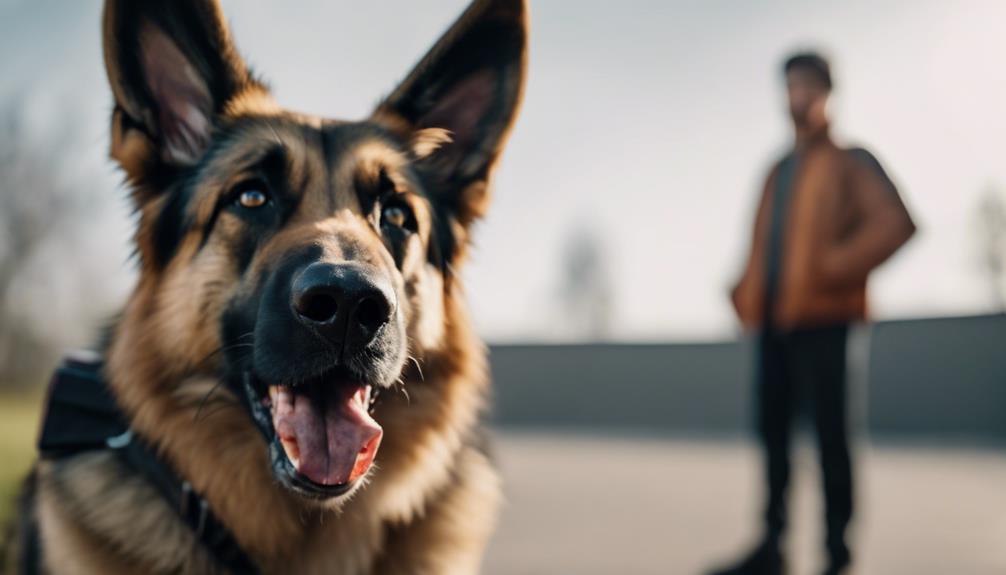🐾 Paw-some Partnership Alert! 🐾
As a pack of German Shepherd enthusiasts at MixGermanShepherd.com, we're always sniffing out the best products for our furry friends. Guess what? When you fetch something from Amazon through our links, we earn a little treat! 🦴
If you've ever felt like managing reactive behavior in German Shepherd mixes is an uphill battle, you're not alone. Understanding the root causes behind these behaviors is crucial, but what comes next is even more vital. By implementing targeted training and management techniques tailored to your dog's specific needs, you can make significant strides in addressing and improving their reactivity. Stay tuned to discover practical strategies that can help you navigate the complexities of reactive behavior in German Shepherd mixes.
Key Takeaways
- Genetic predisposition influences reactivity levels in German Shepherd mixes.
- Proper socialization is crucial to shape behavior and reduce reactivity.
- Training techniques like watch, u-turns, and counterconditioning help manage reactive behaviors.
- Structured routines, positive reinforcement, and professional guidance are vital in managing and training reactive German Shepherd mixes.
Understanding Reactive Behavior in German Shepherds
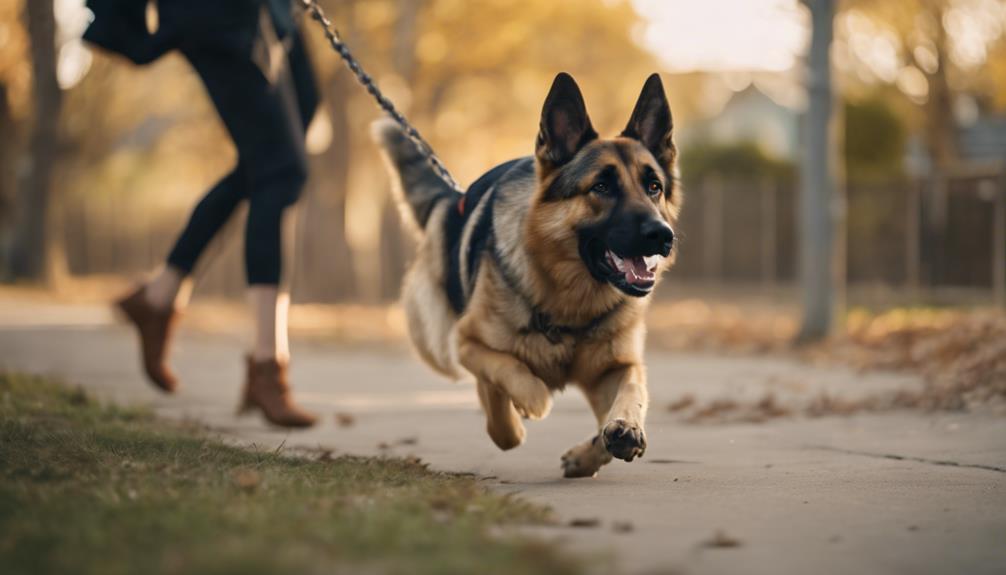
Understanding reactive behavior in German Shepherds requires a comprehensive analysis of their innate territoriality and attentiveness, which often influence their responses to various stimuli. As a dog owner or trainer, recognizing the signs of reactive behavior in your German Shepherd is crucial for effective training and management. Reactive behavior can manifest in different ways, such as barking, lunging, or growling when faced with unfamiliar situations or individuals.
Training plays a vital role in addressing reactive behavior in German Shepherds. Using positive reinforcement techniques can help redirect their focus and promote more desirable responses. When walking your German Shepherd, using a leash can provide control and prevent reactive outbursts. Additionally, early socialization is key to reducing fearfulness and reactivity in German Shepherds. Exposing them to various environments, people, and animals in a positive manner can help build their confidence and lessen their reactivity. By understanding the underlying reasons for reactive behavior and implementing appropriate training and socialization techniques, you can effectively manage and address these behaviors in your German Shepherd.
Genetic Factors in Reactive German Shepherds
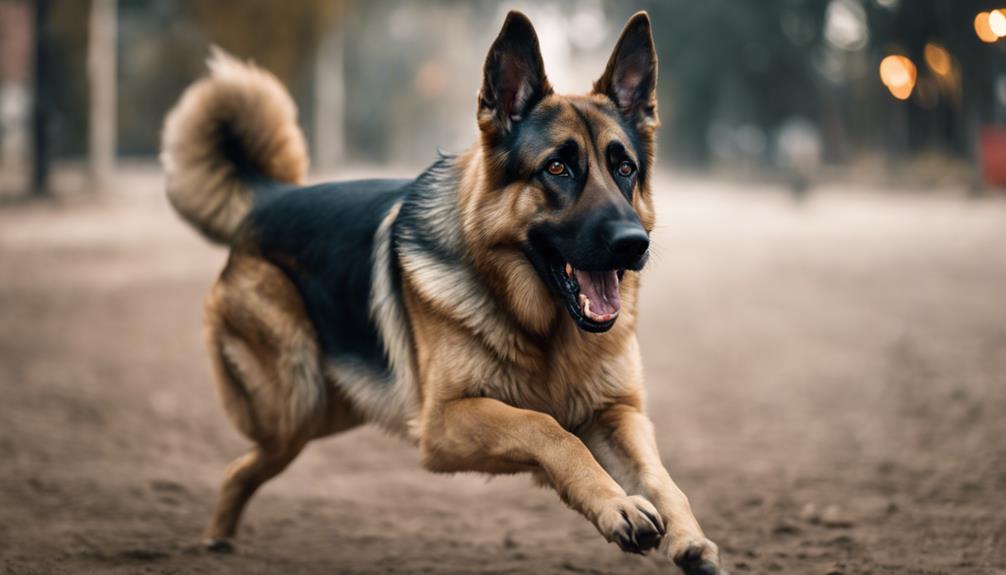
Have genetic factors been identified as significant contributors to the reactive behavior observed in German Shepherd mixes? Genetic factors play a crucial role in shaping the behavior of German Shepherds, including their reactivity and fearfulness levels. Studies indicate that puppies born to fearful mothers may inherit stress-related traits, leading to increased reactivity in GSD mixes. This genetic predisposition can significantly influence the temperament of these dogs, making them more prone to exhibiting reactive behaviors.
Furthermore, research suggests that there has been a rapid increase in nervous dogs across generations due to these genetic factors. Understanding the genetic basis of reactivity in German Shepherd mixes is essential for effective behavior modification and training strategies. By recognizing the genetic influences on fearfulness and reactivity, trainers and owners can tailor interventions to suit the specific needs of these dogs, ultimately enhancing their well-being and quality of life. Incorporating genetic considerations into behavior management can lead to more successful outcomes in addressing reactive behavior in German Shepherd mixes.
Socialization and Reactive Behavior
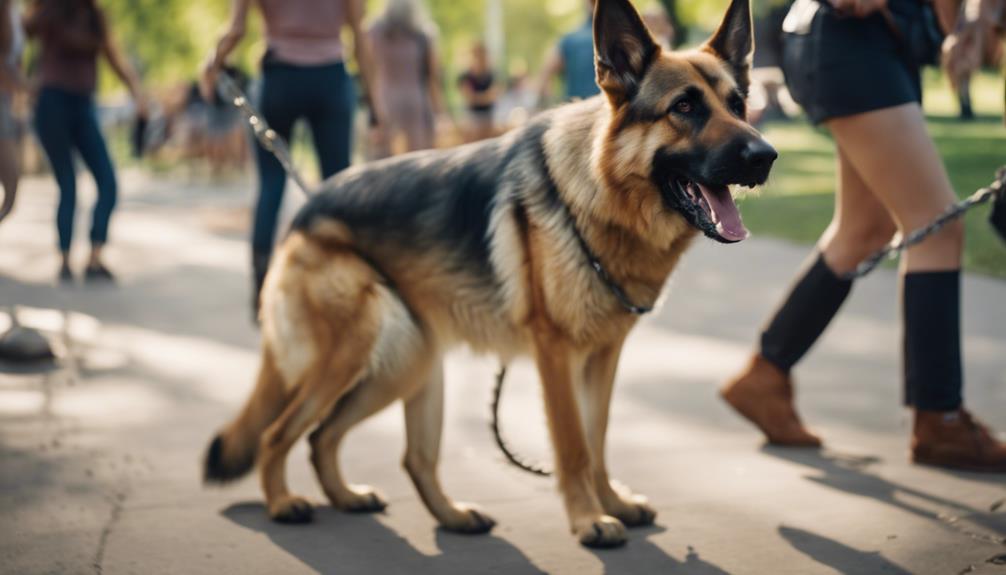
Proper socialization plays a critical role in shaping the behavior of German Shepherd mixes, influencing their reactivity levels and overall temperament. German Shepherds are known for their loyalty and protective instincts, but without adequate socialization, these traits can manifest as fearfulness and reactive behaviors. Early exposure to diverse environments, people, and other dogs can help mitigate reactivity tendencies in German Shepherd mixes. Dogs that are well-socialized from puppyhood are more likely to exhibit confident and non-reactive behavior in various situations.
Lack of socialization can lead to heightened territorial behaviors and reactivity in German Shepherd mixes, making training more challenging. Socialization should be an ongoing process throughout the dog's life to maintain positive behavior. Positive reinforcement training techniques are particularly effective in shaping the behavior of German Shepherd mixes, reinforcing good behavior while discouraging reactive responses. By prioritizing socialization and training, owners can help their German Shepherd mixes develop into well-adjusted and non-reactive dogs.
Training Techniques for Reactive Behaviors
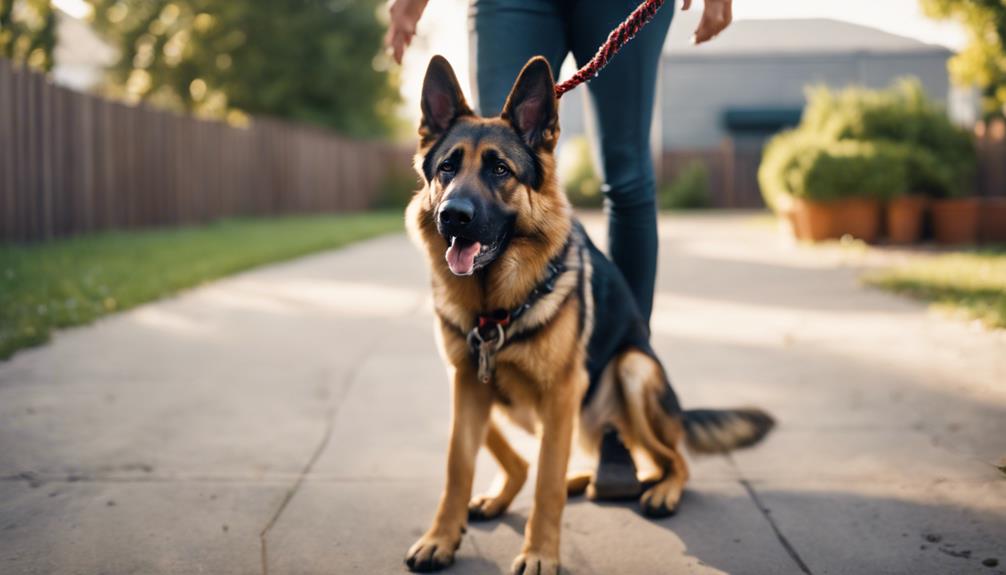
To effectively manage reactive behaviors in German Shepherd mixes, implementing specialized training techniques is crucial for fostering positive behavior modification. Training sessions focusing on techniques like the Watch technique can help redirect your reactive dog's attention away from triggers. Additionally, practicing emergency u-turns and attention-heeling during walks can aid in managing leash-reactive behaviors effectively. Utilizing counterconditioning methods with treats can assist in creating positive associations with previously triggering stimuli. Remember, consistency in training and regular socialization are key components in improving reactive behaviors in your German Shepherd mix. Consider incorporating the principles from Karen London's book 'Feisty Fido' for valuable insights into training leash-reactive dogs. By dedicating time to these techniques and ensuring your dog's exposure to various environments through socialization, you can help your furry friend become more confident and less reactive in different situations.
| Training Technique | Description | Benefits |
|---|---|---|
| Watch technique | Redirects focus from triggers, teaching the dog to ignore them. | Helps in managing attention and reducing reactivity. |
| Emergency u-turns | Used to change direction quickly and avoid triggers. | Prevents escalation of reactive behaviors. |
| Counterconditioning | Associates triggers with positive experiences, often using treats. | Creates positive associations with previously triggering stimuli. |
| Regular socialization | Exposing the dog to various environments and situations positively. | Helps in building confidence and reducing reactivity. |
| Consistent training | Regular practice of techniques for behavior modification. | Reinforces positive behaviors and improves responsiveness. |
Management Strategies for Reactive German Shepherds
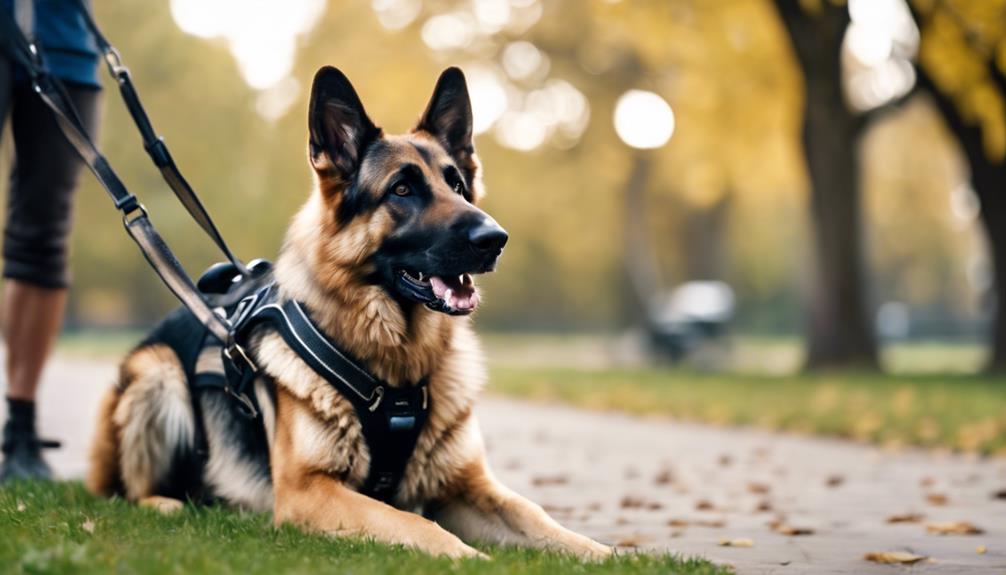
Implementing structured routines and positive reinforcement techniques are essential for effectively managing reactivity in German Shepherds. Consistency in daily schedules provides a sense of security for your dog, reducing anxiety that may trigger reactive behaviors. Positive reinforcement, such as treats or praise, reinforces calm responses, encouraging your German Shepherd to exhibit desired behaviors during training sessions. To prevent escalations, create a safe distance between your dog and potential triggers, gradually exposing them to controlled situations. Mental stimulation and physical exercise play crucial roles in channeling your dog's energy positively and decreasing stress levels. Seeking professional guidance is advisable to develop a personalized behavior modification plan tailored to your German Shepherd's specific needs. With the right combination of structured routines, positive reinforcement, and expert advice, you can effectively manage reactivity in your German Shepherd, promoting a harmonious relationship and a happier, more balanced pet.
Frequently Asked Questions
How Do You Deal With a Reactive German Shepherd?
To deal with a reactive German Shepherd, implement counter-conditioning techniques, positive reinforcement, and desensitization methods. Prioritize behavior modification, seek professional help, maintain consistent training, and practice patience and consistency to address and manage the reactivity effectively.
Can Reactivity Be Trained Out of Dogs?
You can train reactivity out of dogs through behavior modification techniques like positive reinforcement, desensitization, and counter conditioning. Professional help can guide you in addressing canine anxiety, improving socialization skills, and reducing reactive responses over time.
What Type of Training Is Best for Reactive Dogs?
For reactive dogs, positive reinforcement, desensitization techniques, and counter conditioning are essential. Behavior modification through mental stimulation, leash management, and socialization exercises can help. Consistency and patience in training are crucial for success.
How Do You Fix a German Shepherd Aggression?
To fix German Shepherd aggression, employ behavior modification, positive reinforcement, and desensitization techniques. Seek professional help for consistent training. Understand triggers, and practice patience and consistency. These methods will help manage and correct aggression effectively.
Conclusion
In conclusion, mastering the art of managing and training reactive behavior in German Shepherd mixes is akin to sculpting a fine piece of art. By carefully shaping their genetics, socialization, and environment, and implementing effective training techniques and management strategies, you can transform your dog's reactive tendencies into a masterpiece of obedience and harmony. Remember, just as a skilled artist brings out the beauty in their creation, you too can bring out the best in your German Shepherd mix through patience, consistency, and dedication.
